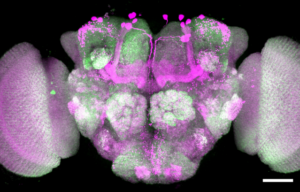David Owald’s project awarded ERC Consolidator Grant
January 31, 2023 | ERC & Charité Press ReleasesSimple Minds: ERC Consolidator Grant for Charité neuroscientist
Source Charité Press Report
If we’re hungry, we should stay awake and eat. If we’re tired, we should sleep instead of eating. It’s obvious that the behaviors involved in eating and sleeping are mutually exclusive. But how does the brain determine which set of behaviors is the right one at any given time? Dr. David Owald, a professor who works in neurophysiology and behavioral science at Charité – Universitätsmedizin Berlin, is delving into this question using the tiny brains of fruit flies as a model. His project, titled Simple Minds, will be receiving about two and a half million euros in funding over the next five years in the form of an ERC Consolidator Grant.
What prompts us to make decisions? What steers our actions and behaviors? And how do we decide what course of action is most effective at a certain time? Questions like these have attracted researchers’ attention time and again over the centuries. “We still don’t know much about how exactly networks of neurons and filter mechanisms in the brain contribute to certain behavioral patterns,” Owald says. “We’re especially interested in the connections between patterns of activity, memory traces, and neuronal filters such as those underlying our vital needs. Our goal is to further our understanding of the physiological underpinnings of these processes, which could unlock avenues for better understanding depression.”
Owald works with an interdisciplinary and international team at the Institute of Neurophysiology at Charité and is a member of the NeuroCure Cluster of Excellence. He has been interested in molecular influences that can change the strength of connections between nerve cells since working on his dissertation. His later research, including a stint at Oxford, focused on how reward memories are encoded in the brains of fruit flies. These days, Owald’s research focuses on the fundamentals of learning processes, addiction behaviors, and memory changes, along with neuronal control of motivation. The new ERC Consolidator Grant follows an Emmy Noether Junior Research Group financed by the German Research Foundation.
Simple Minds: the fruit fly as a model
The common fruit fly, Drosophila melanogaster, has very basic needs. And with only about 200,000 nerve cells, its brain is quite simple as well. Some behaviors that can be observed in this tiny fly and the associated processes taking place in the brain translate with only slight modifications to humans. Recent rapid global advances in genetic techniques make it possible to zero in and observe the activity of individual nerve cells or that of larger neuronal assemblies and measure various forms of control – from molecules to entire network ensembles.
“Based on our previous work, the Simple Minds project is pursuing the hypothesis that sensory information is filtered in a specific way to enable a behavior such as sleep, or falling asleep and staying asleep. This is all based on rhythmic network activity and changes in the strength of the connection between neurons. We aim to observe how exactly that occurs in the brain of fruit flies,” Owald explains. So what happens if the animal cannot accomplish what the brain is telling it to do? If, like Sisyphus, it never reaches the goal despite its best efforts? Owald suspects that a situation like this can give rise to a sense of helplessness similar to that experienced by some patients with depression.
 (Featured image, and above) An image of a fruit fly brain. Individual nerve cells are marked through targeted activation (magenta), while neuronal connections are shown in green. © Anatoli Ender
(Featured image, and above) An image of a fruit fly brain. Individual nerve cells are marked through targeted activation (magenta), while neuronal connections are shown in green. © Anatoli Ender
ERC Consolidator Grant
ERC Consolidator Grants are designed to support excellent Principal Investigators who are pursuing groundbreaking research in Europe at the career stage at which they may still be consolidating their own independent research team. Consolidator Grants calls are open to researchers who have completed a doctorate seven to 12 years in the past. These grants are awarded by the European Research Council (ERC) as part of the Horizon Europe initiative. Each project receives about two million euros in funding for a five-year term.
See also ERC Press Release

